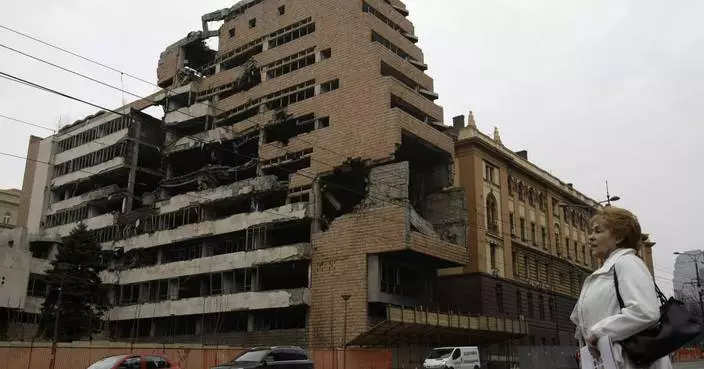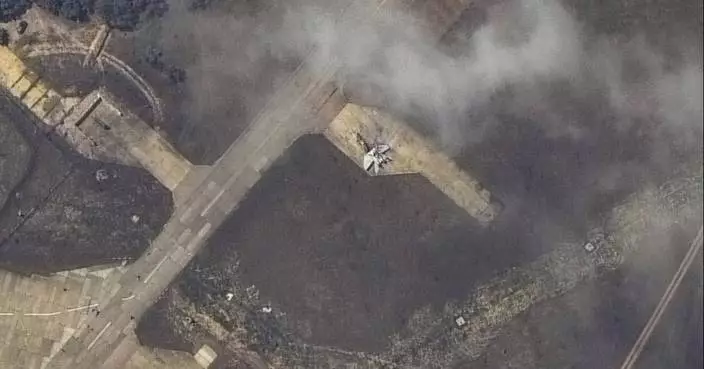RALEIGH, N.C. (AP) — Sheriffs would be required to temporarily hold inmates in jail that federal immigration agents believe are in the country illegally under a bill passed by the North Carolina Senate on Thursday.
But unlike two previous versions of the bill successfully shot down by Democratic Gov. Roy Cooper's veto in the last five years, the measure stands a strong chance of becoming law thanks to GOP seat gains.
The Senate voted along party lines for the measure in a 28-16 vote. Now the legislation returns to the House, where Speaker Tim Moore said Wednesday he supports the measure and that his chamber could vote on the Senate changes as soon as next week.
An affirmative House vote would send the measure to Cooper, who could veto it again. But a GOP supermajority in both chambers since last year means Cooper's veto could be overridden and the bill enacted if Republicans stay united.
The bill, sponsored by several key House leaders, centers around the issue of U.S. Immigration and Customs Enforcement detainers. Those are requests for local law enforcement to notify federal immigration agents about an inmate believed to be in the country unlawfully and maintain custody.
State Republicans have said the need for the bill is apparent as several sheriffs across the state, particularly from Democratic urban counties, haven't cooperated with immigration agents.
“Most sheriffs comply, but we have a few who don't want to,” said Wilson County Republican Sen. Buck Newton on Thursday. “This has been going on for years and years and years that it's reached the point of critical mass.”
Under the proposed changes, all sheriffs or jailers are required to hold inmates accused of serious crimes for up to 48 hours if a detainer is issued. It also mandates the involvement of judicial officials to order law enforcement to hold the inmate in question, according to the bill.
A Senate amendment to the bill would allow anyone to file a complaint with the state Attorney's General Office if they believe a jail administrator is not complying with the law. The legislation would go into effect on July 1.
Senate Republicans used a parliamentary maneuver to table another amendment from Sen. Mujtaba Mohammed, a Mecklenburg County Democrat, that would allow a district attorney to file an objection to a detainer on behalf of a crime victim who seeks prosecution against an inmate in North Carolina. A district judge would have the ultimate say over whether a jail administrator would comply with a detainer request.
“You need to join me in supporting victims of crime and victims of domestic violence and prosecutors across our state by allowing them to seek justice by voting no,” Mohammed said.
Current state law already asks sheriffs or other law enforcement officials to check an inmate’s legal status if they are charged with serious crimes. If the jailer cannot determine someone’s legal status, a query should be sent to ICE.
Two previous iterations of the bill failed to become law in 2019 and 2022 when Cooper vetoed them and Democrats held enough seats to block an override veto.
In response to the legislation, the governor’s office said Wednesday that Cooper was concerned if the bill was constitutional and effective in making communities safer. It would take away authority from sheriffs for “purely political purposes,” spokesperson Jordan Monaghan said.
As with previous bill versions, advocates for Latino immigrants spoke against the mandate in Senate committees this week and during a lobbying day on Wednesday.
They said the requirement would actually make communities less safe by instilling fear into immigrants, especially those who are undocumented, by discouraging them from reporting crimes or building trust with law enforcement.
“The Republican majority in this legislature continues to push forward extreme laws that target immigrants and punishes our community for merely existing,” Axel Herrera Ramos of Durham with the advocacy group Mi Familia en Acción said at a rally outside the old Capitol building. “Don’t tell me it’s about safety.”
At least six states broadly outlaw local agencies' ability to restrict federal immigration law enforcement involvement, National Conference of State Legislatures policy analyst Jay Gideon said in an email. These prohibitions aim to strike down “sanctuary” policies that do not enforce local cooperation with federal immigration agents.
Georgia's Republican Gov. Brian Kemp also signed a bill Wednesday requiring jailers to check inmates' immigration status and criminalizes the failure to do so.
Associated Press writer Gary Robertson in Raleigh contributed to this report.

Opponents of a measure debated by the North Carolina General Assembly that would force local sheriffs to comply with requests by federal agents interested in picking up jail inmates believed to be in the country illegally hold placards against the bill during a rally on Wednesday, May 1, 2024, outside the old Capitol Building in Raleigh, N.C. (AP Photo/Gary D. Robertson)

Axel Herrera Ramos, left, with Mi Familia en Acción in North Carolina, speaks at a rally outside the old state Capitol in Raleigh, N.C., involving advocates for the state's immigration community on Wednesday, May 1, 2024. Ramos and others spoke in opposition to a measure debated by the General Assembly that would force local sheriffs to comply with requests by federal agents interested in picking up jail inmates believed to be in the country illegally (AP Photo/Gary D. Robertson)
WASHINGTON (AP) — Trucks carrying badly needed aid for the Gaza Strip rolled across a newly built U.S. pier and into the besieged enclave for the first time Friday as Israeli restrictions on border crossings and heavy fighting hindered the delivery of food and other supplies.
The shipment is the first in an operation that American military officials anticipate could scale up to 150 truckloads a day, all while Israel presses in on the southern city of Rafah in its 7-month offensive against Hamas.
But the U.S. and aid groups warn that the floating pier project is not a substitute for land deliveries that could bring in all the food, water and fuel needed in Gaza. Before the war, more than 500 truckloads entered the territory on an average day.
The operation's success also remains tenuous because of the risk of militant attack, logistical hurdles and a growing shortage of fuel for the trucks to run due to the Israeli blockade of Gaza since Hamas' Oct. 7 attack. Militants killed 1,200 people and took 250 others hostage in that assault on southern Israel. The Israeli offensive since has killed more than 35,000 Palestinians in Gaza, local health officials say, while hundreds more have been killed in the West Bank.
Aid agencies say they are running out of food in southern Gaza and fuel is dwindling, while the U.S. Agency for International Development and the World Food Program say famine has already taken hold in Gaza’s north.
Troops finished installing the floating pier on Thursday, and the U.S. military's Central Command said the first aid crossed into Gaza at 9 a.m. Friday. It said no American troops went ashore in the operation.
“This is an ongoing, multinational effort to deliver additional aid to Palestinian civilians in Gaza via a maritime corridor that is entirely humanitarian in nature, and will involve aid commodities donated by a number of countries and humanitarian organizations,” the command said.
The Pentagon said no backups were expected in the distribution process, which is being coordinated by the United Nations.
The U.N., however, said fuel deliveries brought through land routes have all but stopped and this will make it extremely difficult to bring the aid to Gaza’s people.
“We desperately need fuel,” U.N. deputy spokesperson Farhan Haq said. “It doesn’t matter how the aid comes, whether it’s by sea or whether by land, without fuel, aid won’t get to the people.”
Pentagon spokesperson Sabrina Singh said the issue of fuel deliveries comes up in all U.S. conversations with the Israelis. She also said the plan is to begin slowly with the sea route and ramp up the truck deliveries over time as they work the kinks out of the system.
Israel fears Hamas will use fuel in the war, but it asserts it places no limits on the entry of humanitarian aid and blames the U.N. for delays in distributing goods entering Gaza. Under pressure from the U.S., Israel has opened a pair of crossings to deliver aid into the territory’s hard-hit north in recent weeks.
It has said that a series of Hamas attacks on the main crossing, Kerem Shalom, have disrupted the flow of goods. The U.N. says fighting, Israeli fire and chaotic security conditions have hindered delivery. There have also been violent protests by Israelis that disrupted aid shipments.
Israel recently seized the key Rafah border crossing in its push against Hamas around that city on the Egyptian border, raising fears about civilians' safety while also cutting off the main entry for aid into the Gaza Strip.
U.S. President Joe Biden ordered the pier project, expected to cost $320 million. The boatloads of aid will be deposited at a port facility built by the Israelis just southwest of Gaza City and then distributed by aid groups.
U.S. officials said the initial shipment totaled as much as 500 tons of aid. The U.S. has closely coordinated with Israel on how to protect the ships and personnel working on the beach.
But there are still questions about the safety of aid workers who distribute the food, said Sonali Korde, assistant to the administrator of USAID's Bureau for Humanitarian Assistance, which is helping with logistics.
“There is a very insecure operating environment,” and aid groups are still struggling to get clearance for their planned movements in Gaza, Korde said.
That concern was highlighted last month when Israeli strike killed seven relief workers from World Central Kitchen whose trip had been coordinated with Israeli officials. The group had also brought aid in by sea.
Pentagon officials have made it clear that security conditions will be monitored closely and could prompt a shutdown of the maritime route, even if just temporarily. Navy Vice Adm. Brad Cooper, a deputy commander at the U.S. military’s Central Command, told reporters Thursday that “we are confident in the ability of this security arrangement to protect those involved.”
Already, the site has been targeted by mortar fire during its construction, and Hamas has threatened to target any foreign forces who “occupy” the Gaza Strip.
Biden has made it clear that there will be no U.S. forces on the ground in Gaza, so third-country contractors will drive the trucks onto the shore.
Israeli forces are in charge of security on shore, but there are also two U.S. Navy warships nearby that can protect U.S. troops and others.
The aid for the sea route is collected and inspected in Cyprus, then loaded onto ships and taken about 200 miles (320 kilometers) to the large floating pier off the Gaza coast. There, the pallets are transferred onto the trucks that then drive onto the Army boats, which will shuttle the trucks from the pier to a floating causeway anchored to the beach. Once the trucks drop off the aid, they return to the boats.
Gambrell reported from Dubai, United Arab Emirates.

The image provided by U.S, Central Command, shows U.S. Army soldiers assigned to the 7th Transportation Brigade (Expeditionary), U.S. Navy sailors assigned to Amphibious Construction Battalion 1, and Israel Defense Forces placing the Trident Pier on the coast of Gaza Strip on Thursday, May 16, 2024. The temporary pier is part of the Joint Logistics Over-the-Shore capability. The U.S. military finished installing the floating pier on Thursday, with officials poised to begin ferrying badly needed humanitarian aid into the enclave besieged over seven months of intense fighting in the Israel-Hamas war. (U.S. Central Command via AP)

The image provided by U.S, Central Command, shows U.S. Army soldiers assigned to the 7th Transportation Brigade (Expeditionary), U.S. Navy sailors assigned to Amphibious Construction Battalion 1, and Israel Defense Forces placing the Trident Pier on the coast of Gaza Strip on Thursday, May 16, 2024. The temporary pier is part of the Joint Logistics Over-the-Shore capability. The U.S. military finished installing the floating pier on Thursday, with officials poised to begin ferrying badly needed humanitarian aid into the enclave besieged over seven months of intense fighting in the Israel-Hamas war. (U.S. Central Command via AP)

This satellite image from Planet Labs PBC shows a pier installed by the U.S. military in the Gaza Strip on Thursday, May 16, 2024. (Planet Labs PBC via AP)

The image provided by U.S, Central Command, shows U.S. Army soldiers assigned to the 7th Transportation Brigade (Expeditionary), U.S. Navy sailors assigned to Amphibious Construction Battalion 1, and Israel Defense Forces placing the Trident Pier on the coast of Gaza Strip on Thursday, May 16, 2024. The temporary pier is part of the Joint Logistics Over-the-Shore capability. The U.S. military finished installing the floating pier on Thursday, with officials poised to begin ferrying badly needed humanitarian aid into the enclave besieged over seven months of intense fighting in the Israel-Hamas war. (U.S. Central Command via AP)















